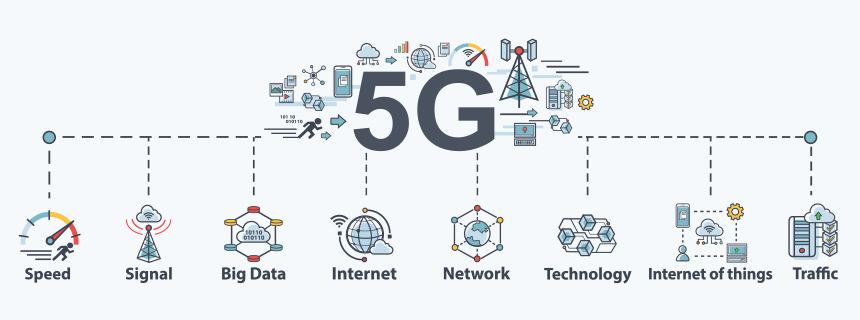Index Surge: Amplifying Your Insights
Stay updated with the latest trends and news across various industries.
5G and the Digital Wild West: Who Will Tame the Connection?
Explore the untamed landscape of 5G! Discover who's ready to conquer the digital wild west and shape our connected future.
Understanding 5G: The Promise and Perils of a New Era
Understanding 5G technology represents a significant leap forward in mobile connectivity, promising to revolutionize the way we experience the internet. With its enhanced speed, lower latency, and increased capacity, 5G enables a vast range of applications from seamless video streaming and virtual reality experiences to the Internet of Things (IoT). This new era of connectivity offers remarkable potential for industries such as healthcare, transportation, and entertainment, driving innovation and efficiency. However, as we embrace this transformative technology, it is crucial to recognize that with great promise comes considerable peril.
Despite the immense benefits of 5G, there are also significant concerns that warrant attention. The implementation of 5G networks raises issues related to cybersecurity, as the increased connectivity of devices can create more vulnerabilities for hackers to exploit. Furthermore, concerns about 5G's impact on health and the environment, particularly regarding radiation exposure and energy consumption, persist among the public. As we navigate this new landscape, it will be essential for policymakers, businesses, and consumers to balance the transformative promise of 5G with a thoughtful analysis of its potential risks.

Navigating the 5G Landscape: Key Players and Challenges
The emergence of 5G technology has transformed the telecommunications landscape, inviting a multitude of key players to join the race for supremacy. Industry giants such as Qualcomm, Ericsson, and Huawei are at the forefront, developing the necessary infrastructure to support this ultra-fast wireless communication standard. Alongside them, major mobile network operators like Verizon, AT&T, and T-Mobile are investing heavily to roll out 5G services globally. As networks continue to upgrade, the competition among these companies intensifies, creating a dynamic environment that is as competitive as it is innovative.
Despite the advancements in 5G, several significant challenges persist that threaten the seamless implementation of this technology. Firstly, the cost of infrastructure development is substantial, making it difficult for smaller players to compete. Additionally, regulatory hurdles and spectrum allocation issues can slow down deployment efforts. Finally, concerns around security and potential health risks related to increased electromagnetic waves are leading to public skepticism. Navigating these challenges will be crucial for stakeholders looking to establish a foothold in the rapidly evolving 5G landscape.
Is 5G the Wild West of Connectivity? Exploring Risks and Rewards
The advent of 5G technology has been met with a mixture of excitement and apprehension, often likened to the Wild West of connectivity. On one hand, 5G promises revolutionary advancements in speed and connectivity, enabling everything from enhanced mobile broadband experiences to the Internet of Things (IoT) integration that could transform industries. Consider the potential applications: smart cities, telehealth services, and autonomous vehicles, all of which could benefit immensely from the low latency and high data transfer rates that 5G offers. However, as with any frontier, there are inherent risks that come with this rapid transformation.
One of the significant concerns surrounding 5G is the issue of security. With millions of new devices connecting to the network, the potential for cyber threats grows exponentially.
- Data privacy risks
- Increased attack surfaces for hackers
- Potential malfunctions in critical infrastructure